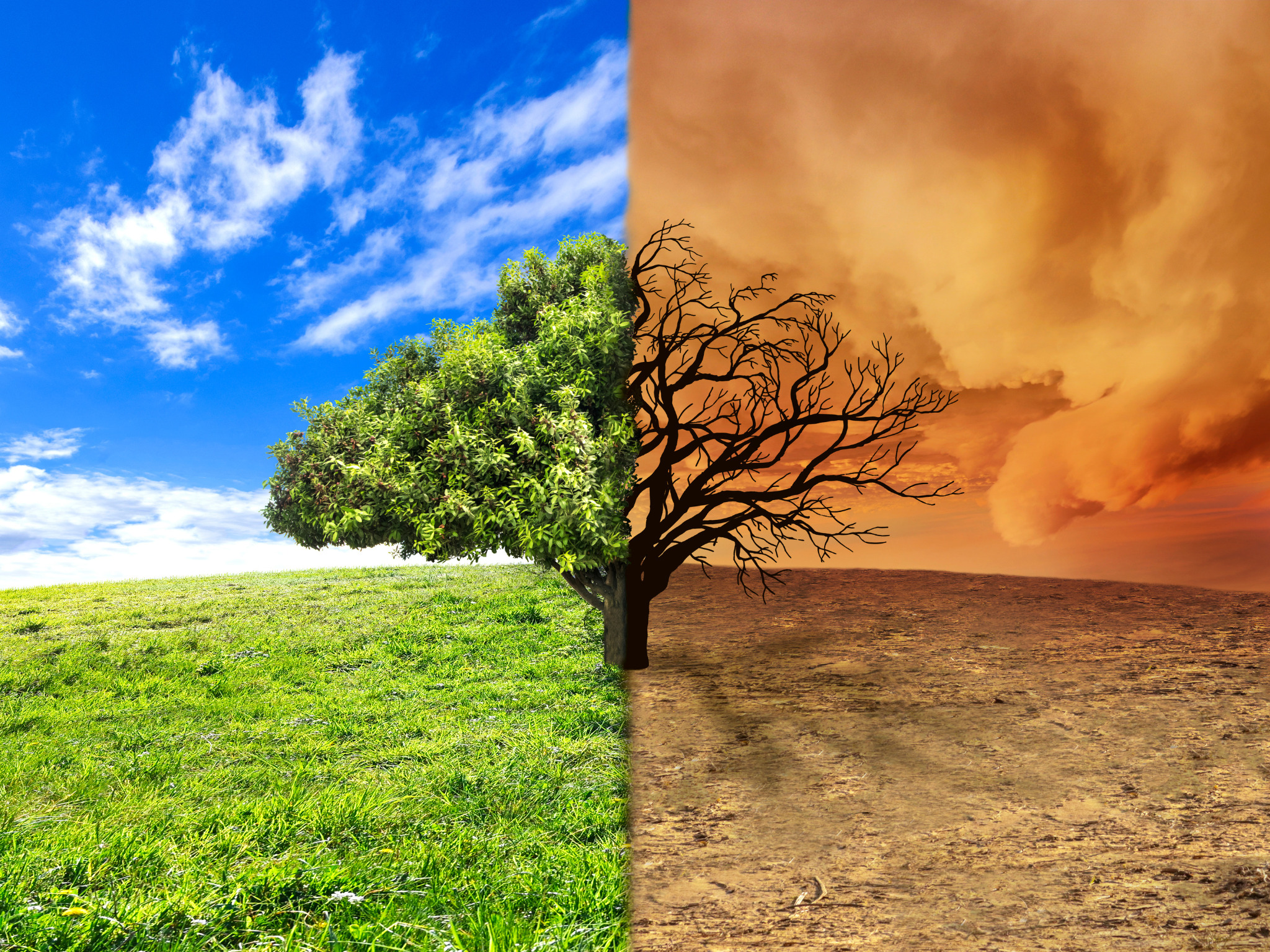‘Woefully Inadequate’: 4 New Major Climate Reports Call Out Global Inaction
9 Mins Read
As we get closer to COP28, the world’s leaders are facing increasing calls to adopt policies and solutions that will help mitigate global heating and meet our climate goals – especially because we’re still so far away, according to four major reports published this week.
Ahead of November 30, when world leaders convene in Dubai for two weeks to discuss climate change policy and action, a quartet of wide-ranging reports outline the sheer extent of the work that needs to be done. All four reports were published on the same day (November 14), and touch upon national action plans, human health, the US’s progress and challenges, and climate change mitigation.
Here’s a summary of the key findings:
UNFCCC: National climate plans are insufficient
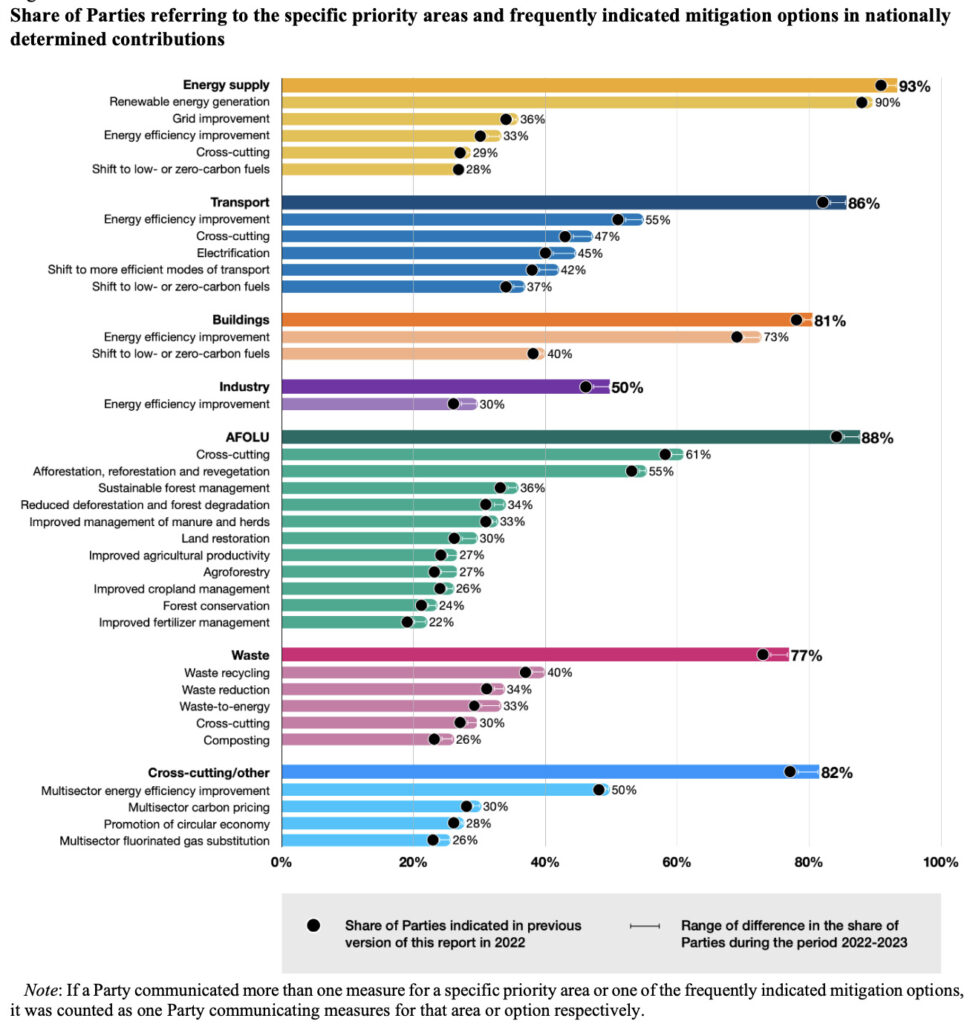
A new report by the UN Framework Convention on Climate Change (UNFCCC) suggests that despite increased action from some countries, national climate action plans to limit global temperature rises to 1.5°C above pre-industrial levels remain insufficient.
According to the UN’s Intergovernmental Panel on Climate Change (IPCC), GHG emissions need to be cut by 43% by 2030, from a 2019 baseline, which i critical to meet the 1.5°C goal by 2100 and avoid “the worst impacts of climate change”.
The report spotlights the importance of COP28, where nations can “regain momentum” to step up their efforts and get their national action plans under the 2015 Paris Agreement (called nationally determined contributions, or NDCs) back on track. The UNFCCC analysed the NDCs of 195 countries and found that while emissions are “no longer increasing after 2030”, they’re still not showing the “rapid downward trend” that’s necessary.
If the conditional elements of the latest available NDCs are actually implemented – which depends on market-building mechanisms and “access to enhanced financial resources, technology transfer and technical cooperation, and capacity-building support” – emissions are projected to be 2% below 2019 levels by 2030, highlighting that the “peaking of global emissions” will occur within this decade.
“There is simply no time left for delays,” said Sultan Al Jaber, president of the UAE-hosted COP28, which he called a “historic turning point”. In a similar vein, UNFCCC executive secretary Simon Stiell called the summit a “game-changer” that can help provide a springboard for a “two-year climate action surge”.
A separate report published the same day by the UNFCCC revealed that if countries’ long-term net-zero plans were implemented on time, GHG emissions would be 63% lower in 2050, but many of these targets are uncertain and postpone critical action that needs to happen now.
“We need to rebuild trust in the Paris process, which means delivering on all commitments, particularly on finance, the great enabler of climate action,” Stiell said. “And ensuring that we are increasing resilience to climate impacts everywhere.”
The Lancet Countdown: Climate inaction brings alarming health risks
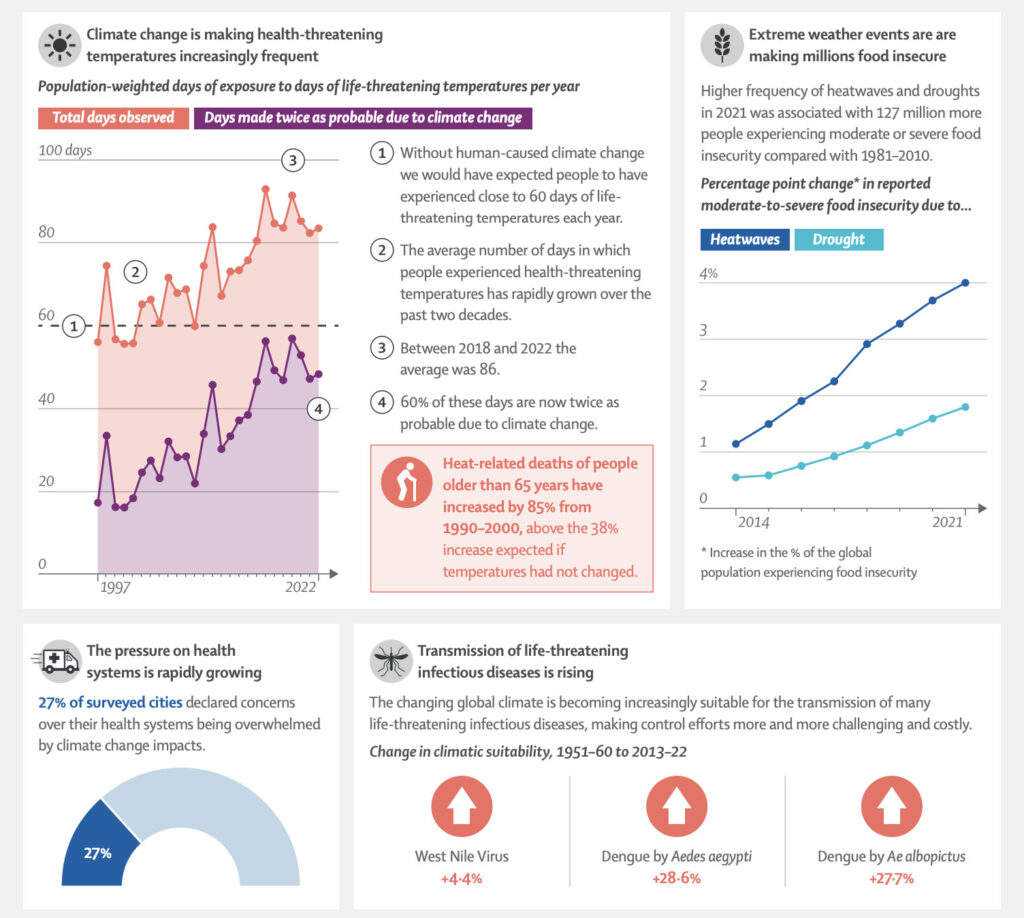
An annual report by The Lancet Countdown looked into the link between climate change and health, revealing “alarming” risks to human health due to our inaction over the former.
For example, people over 65 and infants under a year old – particularly vulnerable to extreme heat – are experiencing twice as many heatwaves each year than they would have between 1986 and 2005. These events jeopardise water security and food production, with millions of people at risk of malnutrition. In 2021, higher frequencies of heatwaves and droughts were associated with 127 million more people experiencing food insecurity compared to annual numbers between 1981 and 2010.
Climate change is also causing an increase in life-threatening diseases and putting pressure on health systems, with 27% of surveyed cities saying their health systems are overwhelmed by the climate crisis. Worryingly, these health threats are only an “early symptom of the dangers our future might hold”, with projections revealing “an intolerable future” with more and more health hazards.
The Lancet Countdown report reveals that the world is currently on track to reach 2.7°C by the end of the century. If temperatures rise by 2°C above pre-industrial levels by 2050, heat-related labour loss and deaths could increase by 50% and 370%, respectively, food insecurity is forecasted to affect nearly 525 million more people, and the potential for dengue transmission is set to rise by up to 37%.
These projections “are a grim reminder that the pace and scale of mitigation efforts seen so far have been woefully inadequate to safeguard people’s health and safety”, according to The Lancet Countdown’s executive director, Dr Marina Romanello.
However, the report did outline some positives around climate change, including a 15% increase in global clean energy funding last year (exceeding fossil fuel investment by 61%), an all-time high employee count in the renewable energy sector, and, crucially, a drop in air-pollution-related deaths by 15.7% since 2005.
The report recommends an acceleration in the fossil fuel phaseout, a health-forward approach to climate change mitigation, the elimination of oil and gas subsidies and increase in climate finance for a healthy transition, an enhanced capacity of health systems to prepare for and respond to climate-related risks, and more resources to monitor, expand knowledge and strengthen research about the links between climate change and human health.
“While ambition to unlock money for adaptation will be critical, health-centred action requires urgent mitigation,” said Prof Anthony Costello, co-chair of The Lancet Countdown. “This will require defending people’s health from the interests of the fossil fuel and other health-harming industries. Transformative climate action is needed today to enable a future where present and future generations can thrive.”
USGCRP: The US must do more to avoid ‘billion-dollar disasters’
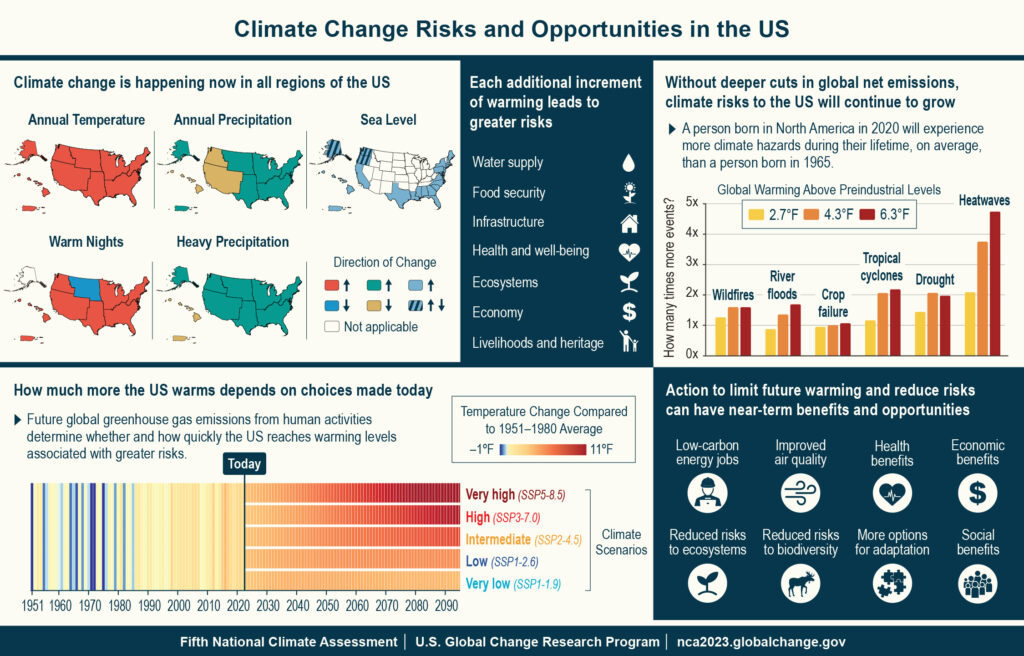
The Fifth National Climate Assessment (NCA5) by the US Global Change Research Program (USGCRP) found that extreme weather events, such as heavy precipitation, droughts, floods, wildfires and hurricanes, cost the country about $150B annually, which is an “estimate that does not account for loss of life, healthcare-related costs, or damages to ecosystem services.”
Evaluating climate impacts across 10 US regions, the report points out some optimistic stats too. Annual GHG emissions in the country reduced by 19% between 2005 and 2019 (with emissions peaking in 2007), largely driven by the energy sector: wind and solar power costs fell by 70% and 90%, respectively, over the last decade, and 80% of new generation capacity in 2020 came from renewable source.
However, despite these improvements, the US faces a “billion-dollar disaster” every three weeks, which disproportionately hits underserved and overburdened communities hardest in terms of risks and impacts. Low-income populations and communities of colour can often lack access to “adequate flood infrastructure, green spaces, safe housing, and other resources” to protect from climate impacts. Some under-resourced communities in suburban and rural areas with less access to climate-ready infrastructure have been displaced due to urban growth patterns.
Meanwhile, extreme heat can lead to higher rates of illness and death in low-income neighbourhoods, which are hotter on average. And areas home to racial minorities and low-income populations have the highest inland flood exposures in the South, while Black communities nationwide are predicted to face a disproportionate share of future flood damages, both coastal and inland.
The report mentions that safe, reliable water supplies are threatened by flooding, drought and sea level rises, disruptions to food systems are set to increase, homes, property, infrastructure and services are all at risk due to extreme weather events, health challenges are expected to be exacerbated, and cultures, heritages and traditions are being disrupted due to climate change.
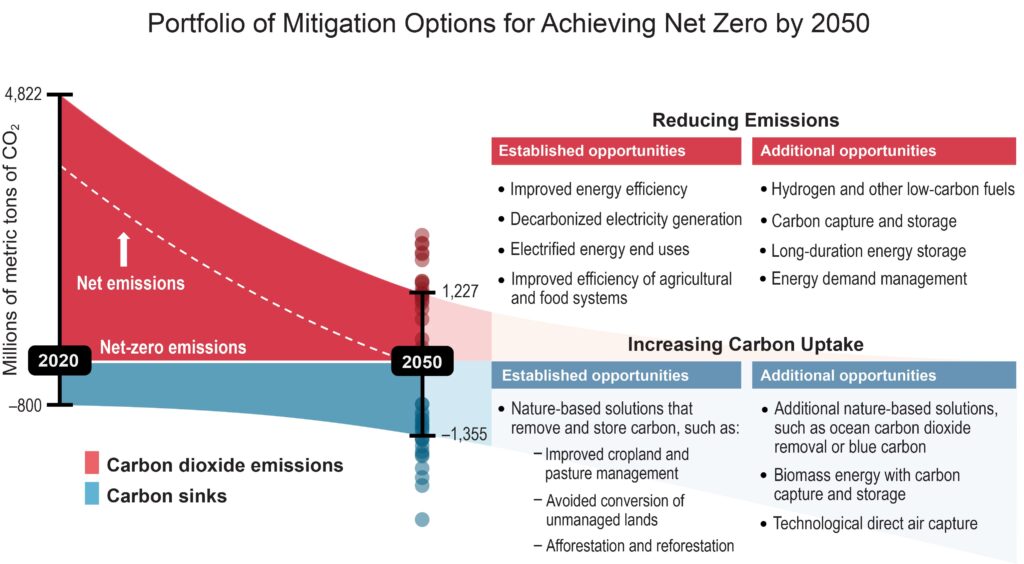
NCA5 recommends decarbonising the energy sector through the expansion of renewable sources, transitioning to zero- or low-carbon transport and heating systems, increasing the efficiency of food production, distribution and consumption, better land management, and implementing urban design that reduces energy demands.
“Today, most Americans have been personally affected, or know someone who has been affected, by climate change and weather extremes,” said Katharine Hayhoe, chief scientist of the NCA5 climate trends chapter. “These impacts exacerbate social inequities, including racial and gender-based disparities; and they emphasise how climate solutions must also be solutions for justice and equity.”
She added: “The good news is we have solutions… We need to invest in nature to take carbon out of the atmosphere as well as [provide] a host of other benefits for our health and biodiversity. And we need to build resilience to the impacts that are already here today.”
State of Climate Action: Global efforts are ‘woefully inadequate’
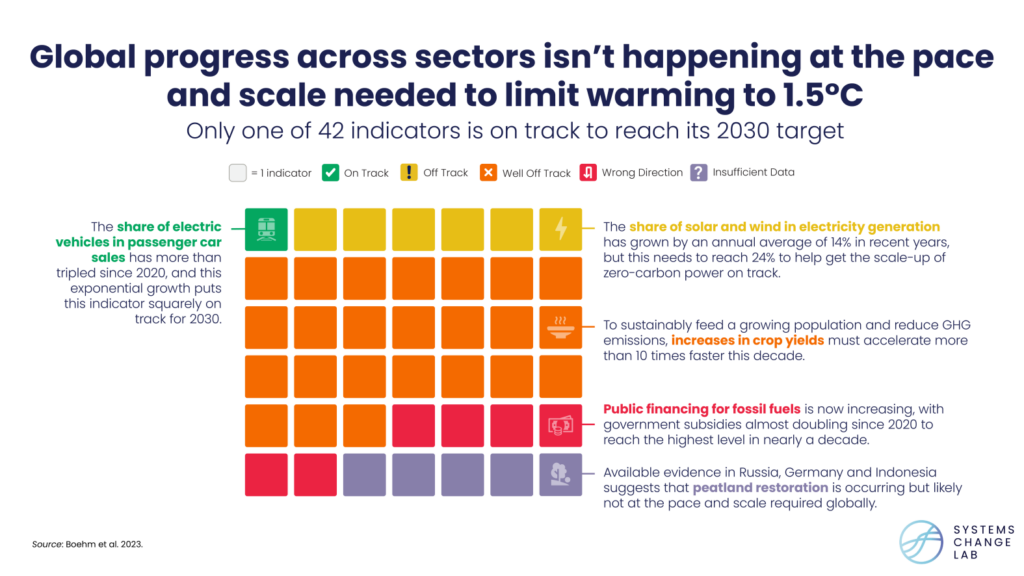
Published under Systems Change Lab as a joint effort between multiple climate organisations, the State of Climate Action 2023 report assesses global progress and action points in line with the 1.5°C limit. The report found that across the world, efforts to limit warming to 1.5°C are failing in every sector – except EVs – and are significantly lagging behind the necessary pace and scale
The authors call progress made in closing the climate action gap “woefully inadequate”, with 41 out of 42 indicators off-track to achieve their 2030 targets. Progress for half of these indicators is well off-track, meaning recent efforts must accelerate twofold, and for six indicators, efforts are heading in the opposite direction.
This includes attempts to “end public financing for fossil fuels, dramatically reduce deforestation and expand carbon pricing systems” – progress in these areas experienced the worst setbacks in a single year, relative to recent trends. In 2021, public investment in fossil fuels rose sharply, with government subsidies doubling from 2020 to reach decade-high levels. Deforestation, meanwhile, increased to 5.8 million hectares in 2022 – that’s the same as losing forest areas greater than the size of Croatia.
There are some bright spots, though. EV adoption has grown by 65% annually, up from 1.6% of all passenger car sales in 2018 to 10% in 2022. This is the first time this indicator is on track for 2030. For another six indicators, efforts are heading in the right direction at a “promising, albeit still insufficient” pace, including the focus on increasing mandatory corporate climate risk disclosure.
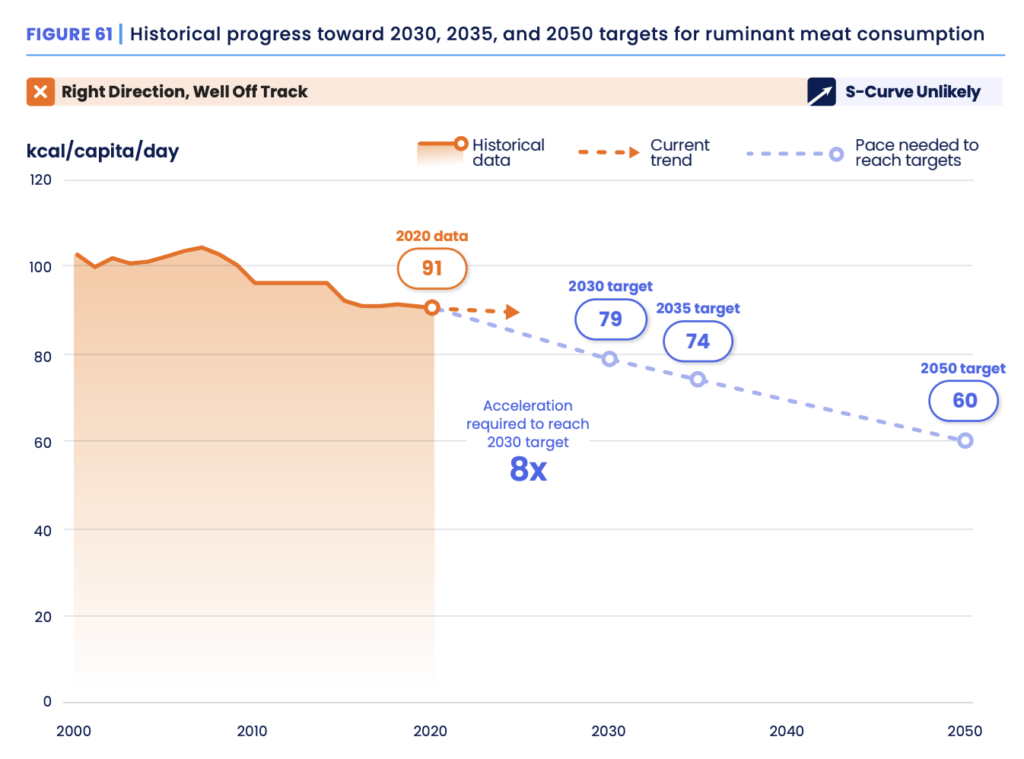
But the report calls for an “enormous acceleration” in climate action to get on track for 2030. Its recommendations include a dramatic increase in solar and wind power (from 14% to 24%), a cole phaseout seven times faster than the current rates, an expansion of rapid transit infrastructure six times faster, a decrease in deforestation rates four times more rapidly, and an eight-times-faster shift to healthier, more sustainable diets.
Expanding on that last point, the authors say this can be done by lowering per capita consumption of meat from cows, goats and sheep to two servings a week or less in high-consuming regions like the Americas, Europe and Oceania. Currently, global consumption of red meat is nearly three times as high as the recommended amount by the Eat-Lancet Commission to meet the 1.5° aim. The report adds that this reduction in meat consumption isn’t required for companies already below the recommended limit, especially in low-income nations.
“Something doesn’t stack up. Clean energy markets are bullish; governments everywhere should be getting in on the act. Yet they continue to use public funds and subsidies to hold onto our fossil past,” said Claire Fyson, one of the report’s lead authors. “Meeting our climate goals means closing down coal power seven times faster and gas power more than ten times faster than today. It’s absurd to keep investing in more of both. At COP28, governments should agree to a fair and fast phaseout of fossil fuels.”
UN secretary-general António Guterres said COP28 “must be the place to urgently close the climate ambition gap”, noting that the “chasm between need and action is more menacing than ever”. He called for a “climate action supernova” in all countries and sectors: “Governments must come together to line up the necessary finance, support and partnerships to increase ambition in their national climate plans and swiftly put those plans into action. And developed countries must rebuild trust by delivering on their finance commitments.”


